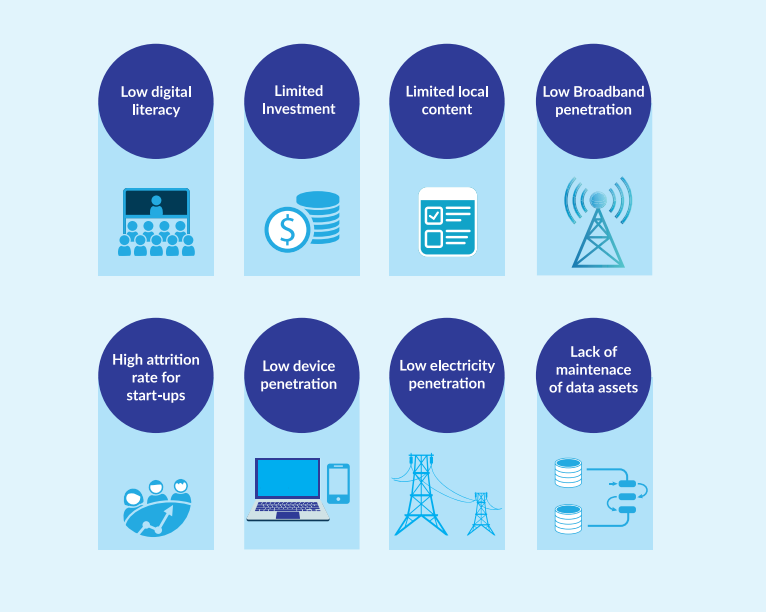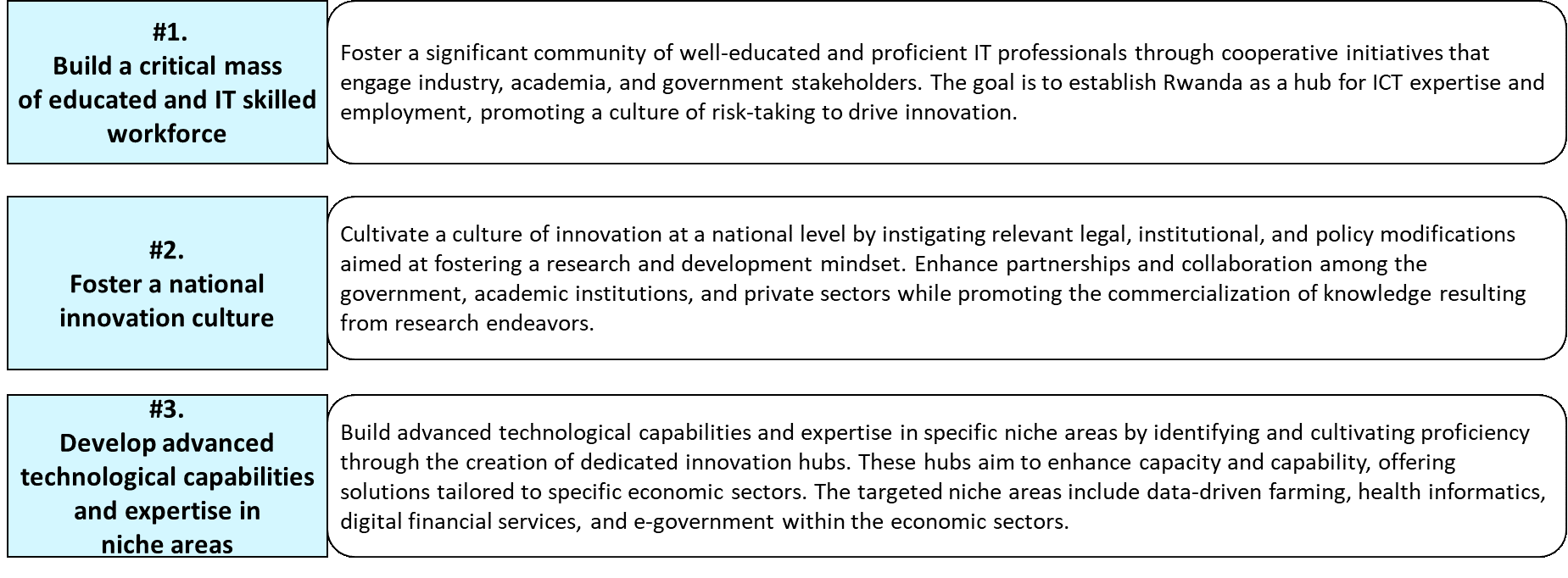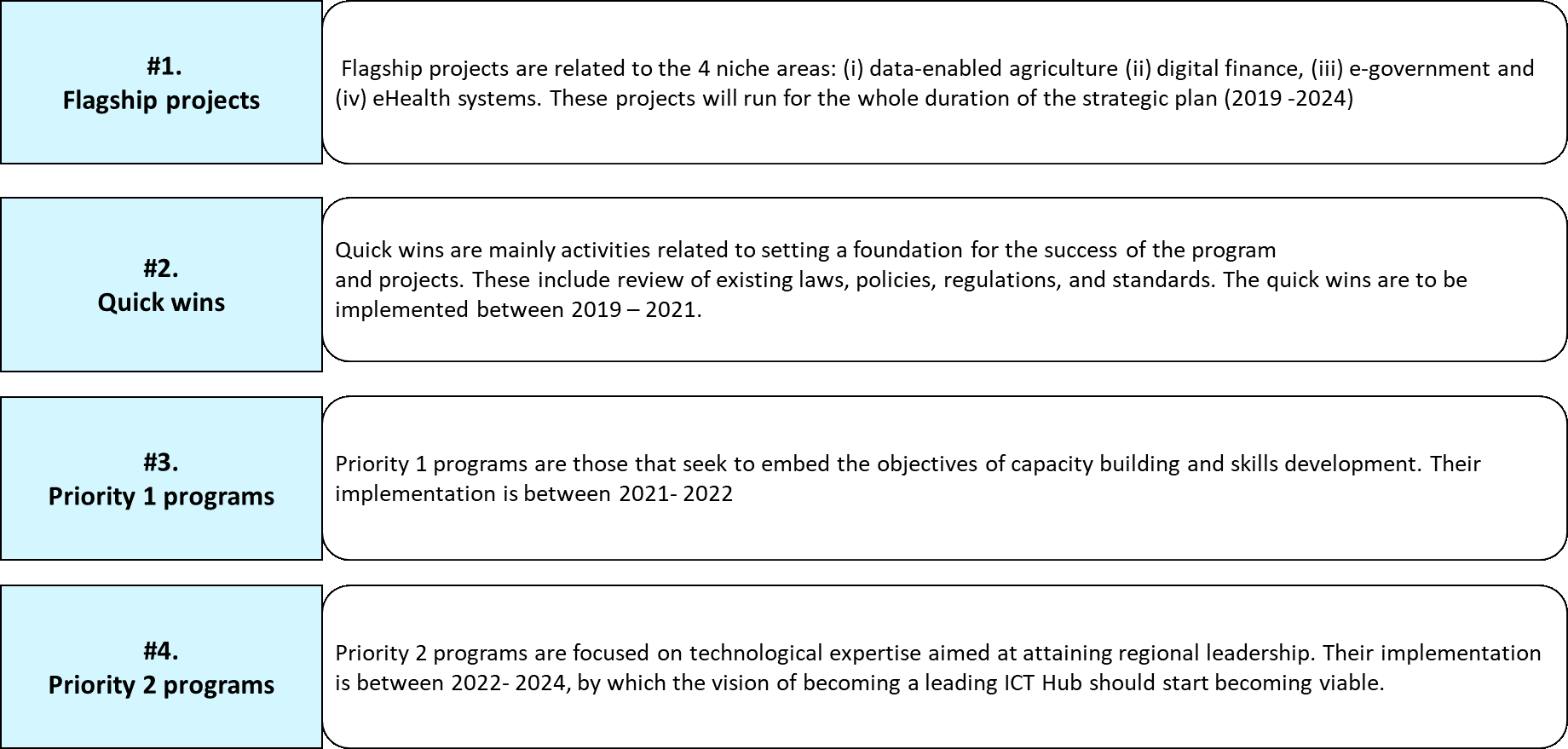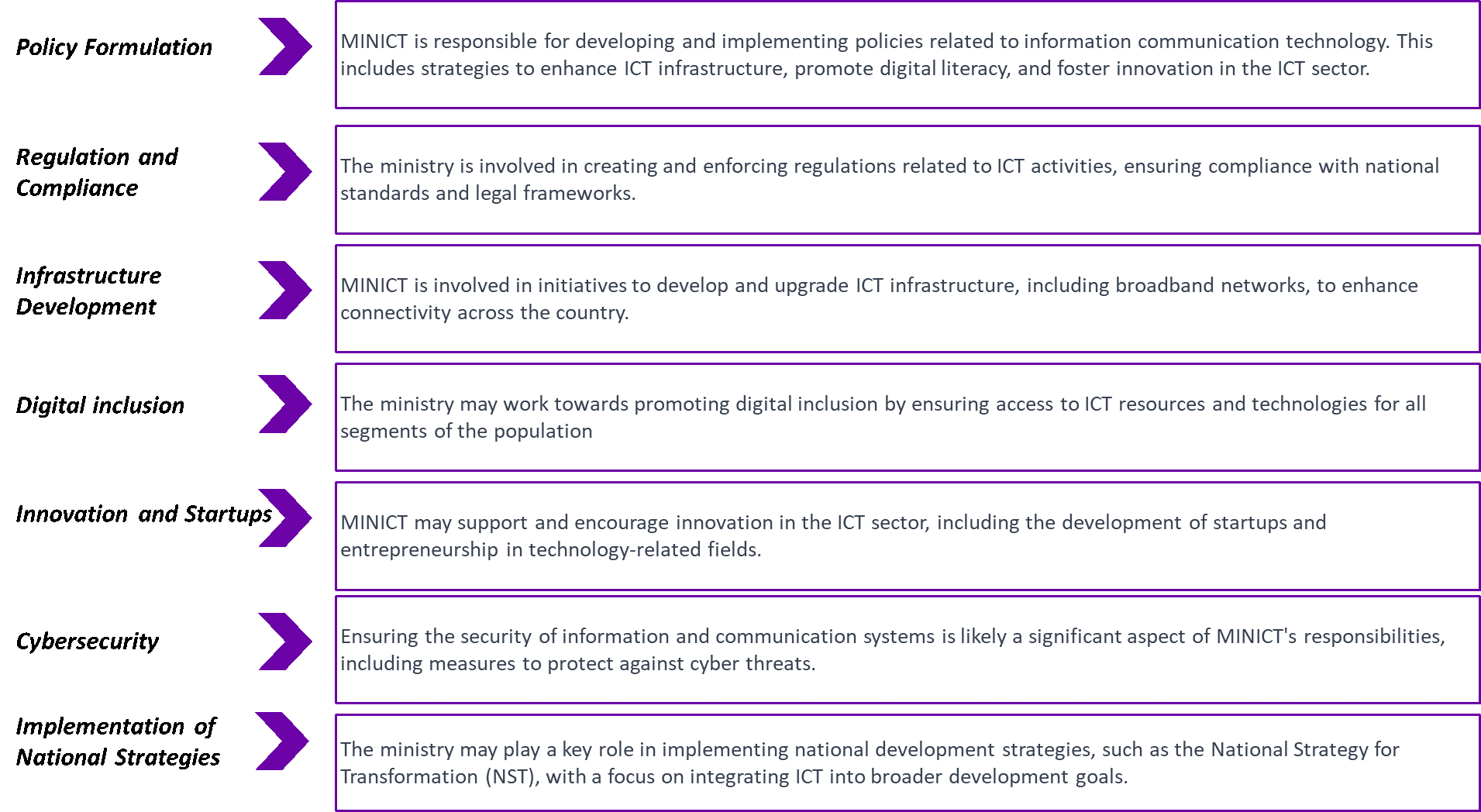The central Role of the Rwanda Information Society Authority (RISA)
Rwanda Master Plan. These strategies aim to reduce the digital divide by ensuring that even remote and underserved areas have access to high-speed internet, enabling citizens to fully participate in the digital economy.
E-governance plays a central role in Rwanda's digital transformation. The government has set up digital platforms for various public services, streamlining processes, reducing bureaucracy and improving transparency. This not only improves the efficiency of government operations, but also makes it easier for citizens to access services.
In addition, Rwanda's education sector has embraced digital technologies to improve learning experiences. Initiatives such as the "One Laptop per Child" programme and the integration of e-learning platforms into schools are helping to develop a literate population, preparing the workforce for the demands of the digital age.
In the entrepreneurial landscape, Rwanda has fostered an environment conducive to innovation and technology start-ups. The Kigali Innovation City project, for example, aims to create a centre for technology and innovation, attracting local and international technology companies.
Rwanda's digital context encompasses a multi-faceted approach, including infrastructure development, e-governance, education, and innovation, all working together to position the Country at the forefront of Africa's digital revolution.
Nationwide Strategies (VISION 2050 and NST)
Vision 2050
Rwanda's Vision 2050 outlines the Country's long-term development goals and aspirations by the year 2050. Vision 2050 serves as a strategic framework to guide Rwanda's socio economic transformation over the coming decades. It is part of Rwanda's broader development planning initiatives, building upon earlier strategic frameworks like the Vision 2020.
Since the beginning of the 21st century, the Rwandan Government has consistently pursued a vision of transitioning into a knowledge-based economy, initially outlined in Vision 2020 with the objective of elevating Rwanda into a middle-income status. This Vision has been seamlessly carried forward into the forward-thinking Vision 2050. In the short term, Vision 2050 emphasises the promotion of macroeconomic stability and wealth creation to reduce reliance on foreign aid. By the medium term (2035), the focus shifts to transforming Rwanda from an agrarian economy to a knowledge-based one, aiming for upper-middle-income status. The long-term goal (2050) involves creating a robust middle class and fostering entrepreneurship, with success measured by attaining developed-Country status and a high development index.
Central to Rwanda's development and transformation agenda is Information and Communication Technology (ICT). Positioned as a pivotal cross-cutting enabler, the ICT sector plays a crucial role in achieving national goals outlined in the Vision 2050.
The Vision is pursuing 2 main goals around which all the stakeholders will be mobilised.
The first objective is the Economic Growth and Prosperity for Rwandans:Generating wealth for all Rwandans is the essence of economic prosperity, necessitating sustained and robust long-term economic growth. This involves ensuring regional and global competitiveness, continual enhancement of productivity, and the creation of quality employment opportunities through strategic investments in both economic and human capital. Rwanda's aspirations are articulated in the goal of achieving upper-middle-income Country (UMIC) status by 2035 and progressing to high-income Country (HIC) status by 2050. To realise these ambitions, specific economic targets include attaining a GDP per capita surpassing USD 4,036 by 2035 and exceeding USD 12,476 by 2050.
The second main objective is to achieve High Quality and Standards of Life for Rwandans
Ensuring an elevated quality of life for Rwandans involves broadening societal participation in national development. This includes augmenting investments in human capital and guaranteeing universal access to essential services, safety, and security. The objective is not only to empower youth, women, men, and the elderly to actively contribute to sustainable development but also to ensure that no one is excluded from the benefits of progress. This commitment aligns not only with Rwanda's principles of good governance but also with the positive values driving societal transformation.
The Rwanda Vision 2050 is built on 5 pillars:
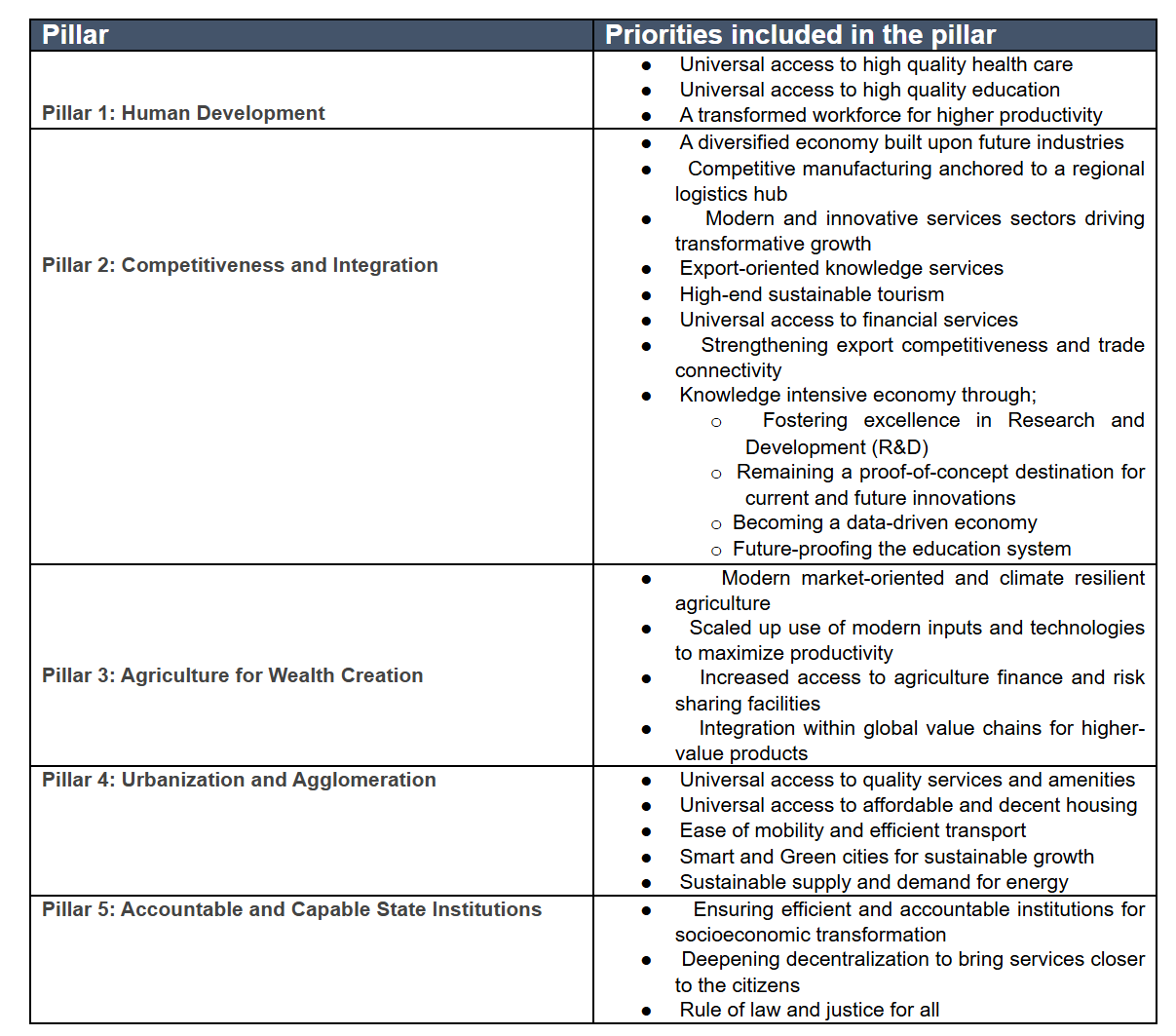
Figure: Pillars of the Vision 2050
The detailed version of the Vision 2050 is available on the MINECOFIN website for consideration.
Rwanda's policy aspirations are translated into action through successive seven-year National Strategies for Transformation (NST1 and the ongoing NST2), supported by detailed sectoral strategies designed to attain the objectives of the Sustainable Development Goals (SDGs).
NST- 1 & NST-2
The "National Strategy for Transformation (NST 1)" in Rwanda is a 7 years Government Program that refers to the Country's overarching development plan. NST 1 is designed to guide Rwanda's economic, social, and political transformation over 2017-2024.
NST 1 is part of the Rwanda 2050 Vision which aspires to take Rwanda to high living standards by the middle of the 21st century and high-quality livelihoods.
NST-1 has 3 domains of priorities: Economic transformation, social transformation, and transformational Governance. Each domain has specific measurable goals and activities.
As NST-1 will end up this year 2024, the Government of Rwanda is currently working on NST-2 and the release of the Strategy before the end of the year 2024.
Smart Rwanda Master Plan
The Smart Rwanda Master Plan is a strategic initiative developed by the Rwandan government to harness information and communication technologies (ICTs) for the Country's overall development. The plan aimed to leverage digital innovations to drive economic growth, improve service delivery, and enhance the quality of life for Rwandan citizens. Here are some key components and objectives associated with the Smart Rwanda Master Plan:
Digital Infrastructure Development: The plan focused on expanding and enhancing the Country's digital infrastructure, including broadband networks and connectivity. A robust ICT infrastructure is fundamental for supporting various digital services and initiatives.
E-Government Services: One of the primary goals was the implementation of electronic government services to streamline administrative processes, reduce bureaucracy, and enhance transparency. This involves the digitization of government operations for improved efficiency and accessibility.
Digital Literacy and Inclusion: The plan recognized the importance of ensuring that all citizens have access to and can benefit from digital technologies. Initiatives related to digital literacy and inclusion were likely included to empower individuals and communities through technology.
Innovation and Entrepreneurship: Supporting a culture of innovation and entrepreneurship in the technology sector is a common feature of such plans. Incubators, startup support programs, and initiatives to attract tech investments may have been part of the Strategy.
Cybersecurity: Given the increasing reliance on digital technologies, ensuring the security of information and communication systems is crucial. The Smart Rwanda Master Plan was designed to put in place cybersecurity measures to protect against potential threats and vulnerabilities.
ICT Strategy 2018-2024
The Government of Rwanda has set up a 7YGP (7 years Government Program) known as National Strategy for Transformation (NST-1) which covers the period from 2017 to 2024. Since 2000, in order to support the Vision 2020 and the 7YGP of Rwanda, the ICT sector has been developing and implementing its own strategies and plans. Then in 2017, the ICT sector drew its Strategy which was based on the timeframe and initiatives of NST-1 that will go from 2018 to 2024.
The plan aims to achieve set of targets which will culminate Rwanda to fast track its path of continued socio-economic transformation.
With the general objective of fast-tracking Rwanda’s transformation to a knowledge-based society as stated in the SRMP Strategy, the ICT Strategy targets three specific objectives:
Broadband for all by 2024Government Digital Transformation by 2024Digital Literacy for all
In this sense, the Strategy identified eight challenges that must be addressed in order to achieve the vision of becoming a leading continental ICT Hub.
Figure : ICT sector challenges identified in the 2018-2024 Strategy.
The Strategy highlighted 3 strategic objectives described below:
The ICT Strategy highlighted strategic programs and projects are categorized into 4 categories:
Flagship projectsQuick winsPriority 1 programsPriority 2 programs
Figure: Categories of projects of the ICT Strategy 2018-2024
A more detailed action plan of the Strategy is contained in the ICT Strategy that can be found on the MINICT website.
Under the overall management of MINICT, the plan implementation responsibilities are shared among several institutions. RISA will be mainly responsible for monitoring evaluation, and Information Security. More detailed roles of RISA are: progress review of the plan, Strategy alignment and resource mobilization.
Legal Framework in the Digital Context
Rwanda has several laws and regulations governing information and communication technology (ICT) within the Country.
According to the ICT Regulatory Tracker (International Telecommunication Union, Geneva 2021), Rwanda is a fourth generation (G4) regulator but already has a G5 mindset. As a Country that has put ICTs at the centre of its development since 2000, Rwanda has duly earned its recent entry into the small but growing club of African countries to be rated at the G4 level. G4 is characterised by integrated regulation, led by economic and social policy goals.
The main laws (not limited) governing ICT in Rwanda are:
Law No. 18/2010 of 12/05/2010 Relating to Electronic Messages, Electronic Signatures and Electronic Transactions. This Law governs electronic transactions, electronic messages and prevention of misuse of computers in electronic transactions, electronic signature and all other applications relating to information technology.
Law N° 22/2016 of 17/06/2016 Relating to Electronic Messages, Electronic Signatures, and Electronic Transactions: This law addresses matters related to electronic communications, signatures, and transactions in the digital environment.
Law No. 60/2018 of 22/08/2018 on Prevention and Punishment of Cyber Crimes: This law Regulates Cybercrime prevention and punishment in Rwanda. It focuses on cybersecurity measures and addresses offences related to cybercrime.
Law N° 70/2018 of 31/08/2018 Regulating Information and Communication Technologies (ICT): This law provides a comprehensive framework for the regulation of ICT activities in Rwanda, covering aspects such as cybersecurity, electronic transactions, and data protection.
Law N°24/2016 of 18/06/2016 governing information and communication technologies: This law defined a regulatory framework for telecommunication operators to promote services or products in a fair and competitive manner in Rwanda.
Law No. 058/2021 of 13 October 2021, relating to the protection of personal data and privacy: The law protects personal data and ensures privacy of individual users.
Law n° 029/2023 of 14/06/2023 governing population registration in the national single digital identity system.
Rwanda's policy framework further reinforces the nation's dedication to addressing climate change issues within the Conference of the Parties to the United Nations Framework Convention on Climate Change.
The advancement that is needed in the legal framework of Rwanda is the progress to reach the fifth-generation level, which has the important additional aspect of deep and meaningful collaboration as a means of achieving development-oriented digitalization and digital transformation.
The Role of the Ministry of ICT
The Ministry of Information Communication Technology and Innovation (MINICT) plays a crucial role in overseeing and promoting the development of information and communication technology (ICT) in Rwanda. MINICT has the mission to address national priorities relating to economic growth and poverty reduction through development and coordination of national policies and programs related to information, technology, communication, and innovation as well as citizen’s empowerment.
The Ministry of ICT and Innovation is responsible for overseeing and assessing the implementation of national policies, strategies, and programs aimed at fostering technology and communication. Additionally, it is tasked with formulating and distributing policies, strategies, and programs related to ICT and Innovation. The Ministry's operational activities are managed through two main departments: Digital Government Transformation and Innovation and Business Development. Moreover, the Ministry administers a program known as Innovation and ICT Private Sector Development.
Here are Key domains of intervention of MINICT:
Figure: MINICT domains of intervention
To accomplish these responsibilities and help the Ministry to achieve its mission, MINICT has the following affiliated agencies:
|
|
|
|
|
|
|
|
|
|
|
|
|
|
|
|
Table: MINICT affiliated agencies
The central Role of the Rwanda Information Society Authority (RISA)
Established under the Ministry of ICT and Innovation, the Rwanda Information Society Authority “RISA” is a public institution established in 2017, governed by the Presidential Order N° 077/01 of 09/12/2022. RISA derives from the former IT Department of Rwanda Development Board, RDB. Currently, it is an affiliated institution to the Ministry of ICT and Innovation.
RISA plays a critical role in the development of Rwanda's ICT sector and is focused on promoting the use of ICTs to drive socio-economic development and improve the lives of Rwandans.
RISA has been put in place to be at the forefront of all ICT projects’ implementation and streamline research, infrastructures, and innovation within the ICT sector. Furthermore, RISA oversees the implementation of Smart Rwanda Master Plan initiatives.
RISA has the mission of digitising the Rwandan society through increased usage of Information and Communication Technologies and innovation technology as a cross-cutting enabler for the development of the other sectors spearheading Rwanda’s digital and social economic transformation.
Rwanda Information Society Authority is mandated to coordinate the implementation of projects that deliver information and communication technology services, this is done through supporting government institutions to deliver their ICT initiatives to be accessed by the institution workers and the citizens. RISA is also in charge of digitising government services and ensures that they are easily accessed by the citizens.
Rwanda Information Society Authority is headed by the Chief Executive Officer and two deputies: Government Chief Information Officer and Government Chief Innovation Officer.
RISA’s responsibilities include:
(a) to participate in initiating and implementing national Information and Communication Technologies policies and programs in order to fast-track socio-economic growth;
(b) to implement strategies which expand the access and affordability of Information and Communication Technologies infrastructures and services;
(c) to accelerate community development through mainstreaming Information and Communication Technologies in national socio-economic sectors;
(d) to prepare and coordinate programs that increase the required skills in the field of Information and Communication Technology in order to achieve a knowledge based economy;
(e) to establish and strengthen innovation programs in Information and Communication Technology;
(f) to coordinate the implementation of projects and digitization initiatives that deliver Information and Communication Technology services;
(g) to cooperate and collaborate with national, regional and international institutions with a similar mission;
(h) to coordinate national Information and Communication Technology procurement for commonly procured Information and Communication Technology goods and services;
(i) to advise Government on all activities which can fast track the development of Information and Communication Technology;
(j) to provide technical assistance related to Information and Communication Technology as needed in public institutions;
(k) to promote use of public key Infrastructure based technology in order to ensure authenticity, data integrity, confidentiality and accountability;
(l) to promote and enhance general Information and Communication Technology knowledge, sensitization and awareness and Emerging Technologies;
(m) to establish necessary Information and Communication Technology guidelines and Blueprints based on national, regional and international principles and monitor their implementation;
(n) to recruit and deploy Information and Communication Technology Staff in public organs;
(o) to perform any other responsibility, which is not contrary to its mission, as may be assigned by law or by competent organs.

